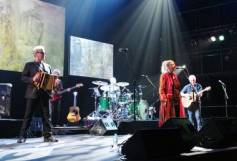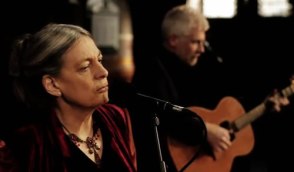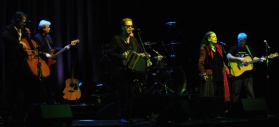 Well was The Hobbit An Unexpected Journey really going to be as good as any of the Lord of the Rings films? But it is testament to how good those films are that this feels sadly underwhelming.
Well was The Hobbit An Unexpected Journey really going to be as good as any of the Lord of the Rings films? But it is testament to how good those films are that this feels sadly underwhelming.
Because this is visually spectacular stuff. Stunning in fact. And just because we expect no-less than this should not mean that we take it for granted, for this is mostly an entertaining, amazingly well produced epic film. But…………..
It opens extremely well with a prologue set in the dwarf mountain home of Erebor, a location expertly realised for the screen with the type of visionary imagination that movie-making of this type is surely all about.
We first meet the title character, Bilbo Baggins, as his elder self, played wonderfully by Ian Holm reprising the role from the Rings films. The Celtic score and the set of the Hobbit’s home, the Shire, are all welcomingly familiar from those films and it is a joy to see Elijah Wood in a brief scene as Frodo. It feels good to be back here in this wonderful world with these wonderful characters.
But that perhaps is the problem. The best bits about The Hobbit are all the things we have seen in the Rings films. Nothing here is new. Nothing at all. And the great things that are repeated from the Rings trilogy, including jaw dropping battle scenes and otherworldly locations, are not bettered in this film.
The central story is thin too. The three Rings films are from three books. The Hobbit is one book, with three films being drawn from it, and although I haven’t read the book, this opening film feels drawn out.
In fact there barely is a story. A small band of dwarves want to take back their home of Erebor (and all the gold in it) that a dragon has taken from them. So with the help of wizard Gandalf and Hobbit Bilbo they begin a journey across Middle Earth to their home. That is it.
It is a far less noble cause than the protagonists in the first Rings film, The Fellowship of the Ring, are pursuing. Yet the main quest of the Hobbit sees the characters in almost exactly the same type of voyage as we have seen in Fellowship. They travel across sweeping plains, along narrow dangerous mountain passes, through a mountain (with a bizarre and misguided musical number by the supposedly fearsome Orcs who look far more plasticky in the Hobbit), all in order to reach a mountain. Sound familiar?
The only interesting story elements are the hints along the way of darker things stirring in Middle Earth, which are clearly the preludes to the much more significant end-of-the-world issues faced in the Rings films.
Unfortunately therefore the main story just doesn’t engage. And this is not helped by pretty poor action sequences.
I know you have to suspend disbelief when watching fantasy movies, but the Troll scene and that scene in the Orc mountain lair just do not convince at all. Both feel childish. And remarkable in the fact that in the former the dwarves are foiled by dull-witted oaths, while in the second they beat an entire army.
This mountain lair scene also feels so done before…. A chase across wooden bridges in a sort of mountain mine….. Indiana Jones and the Temple of Doom? The Goonies? And what’s more it looks like a video game, with no sense of danger or excitement.
Returning characters do nothing they didn’t do in the Rings films, including Gandalf, Saruman (what makes him a great wizard is now even more of a mystery) and the elves of Rivendell, though a scene with Ian McKellen’s Gandalf and Cate Blanchett’s Galadriel (the sole female character in the film and only in it for about five minutes) is the warmest of the movie.
But what about Martin Freeman’s leading role as Bilbo? Although I found it hard at times to accept him as a Hobbit, with his face too worldly for the fresh-faced innocence the rest of that race seem to embody, at other times he was very convincing and moving.
But Bilbo is not really the leading character. In fact it is not really clear why he is there. And after his initial bumbling reluctance at leaving his comfortable home, he seems to deal with the perils the gang face with remarkable acceptance and skill.
And then there is the script. I hate to complain more, but I have to mention this. Because like the characterisation, the script feels like it has been rushed out with nowhere near the care taken over it that the film deserves (or that has been taken in the set productions).
It may be clever to have Director Peter Jackson speaking directly to his audience through Gandalf when the wizard says near the start “All good stories deserve embellishment.” Or to have characters speak chapter headings of Tolkein’s original book. But no matter how gravely “Out of the fire, into the frying pan” is said, it sounds awfully clichéd and lazy.
 But am I being too harsh? I mean as I said, this film looks great (using a pioneering double shooting speed) even if the 3D as per usual seems wasted.
But am I being too harsh? I mean as I said, this film looks great (using a pioneering double shooting speed) even if the 3D as per usual seems wasted.
And of course there is Gollum. He is only in one scene, but it and he is magnificent. And while perhaps again, offering us nothing new, in this case it doesn’t matter. Gollum has to be one of the best movie characters ever created. He is scary, funny, sad and utterly fascinating.
So, full of disappointments, but still impressive, and precious, film making!






